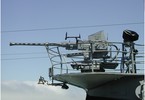Hong Kong was our home base, Shanghai, Nagasaki, Saigon, Manila, Singapore, and Batavia (Batavia is the old Dutch name for present-day Jakarta).
The weekly S&P500 chart is indicating the market is making lower highs and lower lows. Whether we believe it or not, the market trend has changed decisively from up to down until further notice.
Certainly the courage of our convictions will be challenged by a spectacular short covering rally, but don’t’ be deceived, we are in correction mode at best or a dreaded bear market at worst.
When I was young - during the mid-80s - I grew up in a house where my father was a radio amateur aka. Ham Radio.
We had a monstrous antennae poking into the sky, attracting attention, while the country (South Africa) was in lock down due to a state of emergency and under a total media blackout.
As a result we were technologically advanced for the time and had this most amazing machine called the Apple II computer – remember this beauty?
Essentially it was a random number generator which created random stock movements for one hundred securities either to go up or down.
The code behind the game would never eliminate a security totally. If a stock went to 1c it would sit there for a few turns, which equated to months, then resume an upward random march.
Yes, I would agree but I also found that style and simplicity of investing in beaten down issues intriguing.
“The basic strategy of the game is to buy goods (opium, silk, arms, and general cargo) at a low price and sell them at a higher price. Opium is special in that it can be confiscated at random points by the local authorities, resulting in a fine for the player. This makes dealing in opium riskier however, it is also in general the most profitable item for trade.
The player may trade at any of seven ports: Hong Kong, Shanghai, Nagasaki, Saigon, Manila, Singapore, and Batavia (Batavia is the old Dutch name for present-day Jakarta). The port at Hong Kong is the player's home port. Here the player has access to ship repair, a money lender, and a bank. Often in Hong Kong, the local extortionist Li Yuen asks if you would like to "donate" money to the Sea Goddess. If the player refuses to donate, Li Yuen eventually sends a fleet of hostile ships (which are much more difficult to fight than ordinary pirates).
The player also has the option of borrowing money from Elder Brother Wu, the moneylender. Goods may be stored in the warehouse in Hong Kong, while waiting for prices to rise. However, purchases left in the warehouse may be stolen if left too long. Rates of theft are higher with higher-end commodities such as opium or silk.
Note: A bug in the game allows the player to overpay the moneylender, acquiring "negative debt". This "negative debt" will accumulate interest very quickly, and will count towards the player's net worth.”
At this point the reader may be thinking I had an affinity for trading and/or spotting computer bugs! Either way, I consider the discipline of focusing on dislocations, where the ‘laws’ of investing often break, an important characteristic of value investing.
The final nail in my value investing education came years later when I picked up a book of Piggy Banks on the cover called Contrarian Investing – which can be yours at Amazon for $0.01 for a used copy --- VALUE!!
What I like about Contrarian Investor and have used successfully for decades is the simplicity of finding deep value stocks and constructing a diversified portfolio.
Once again, reinforcing my belief that investing is not rocket science but merely a set of rules executed with discipline and perseverance.
Without giving away the crown jewels (you can do that for 1c by buying the book at Amazon or reading the reviews at Amazon), you can identify a value stock by initially screening for stocks that are down more than 50%. Then apply some simple fundamental metrics such as:
Hence those lip smacking values you see right now may end up being the proverbial value trap i.e. what looks cheap now becomes cheaper still.
And of course, unlike my stock market game where every stock had a floor of 1c, bankruptcy is a very real outcome for many companies, driving their equity value to exactly NIL.
I have no panacea for the value trap except some guidelines when creating your shopping list in the value domain:
That decision is yours alone but we certainly keep an eye out on those sectors that have been hit the most. Marketwatch has a nice industry screener for that. Here is a snapshot as of last week for the worst sectors by percentage change over the previous year:
January’s market lurch, the second since August 2015, likely indicates a bear market of greater magnitude ahead.
The time to get defensive was December ‘15 when calm reigned and there was a bullish undertone to the market.
Other times to become defensive will present themselves after spectacular short covering rallies. YOU WILL NOT FEEL LIKE SELLING when those happen!
Now is the time to be compiling your buy list for the next and inevitable upswing – whenever that may occur.
Thank you for reading my post. I regularly write about private market opportunities and trends. If you would like to read my regular posts feel free to also connect on LinkedIn, Twitter or via Atlanta Capital Group.
Greg Silberman is the Chief Investment Officer of Atlanta Capital Group. Atlanta Capital Group specializes in creating custom private market solutions for RIA/Family Office clients and is an active acquirer of independent wealth management practices.
Nothing in this article should be interpreted as a recommendation to buy any security. Please conduct your own due diligence.

